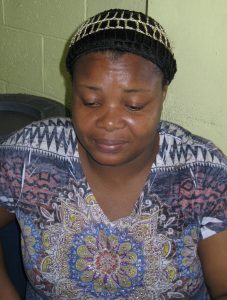
Interviewee: Schella Destine
Interviewer: Jeffrey Boyce
Date: June 27, 2016
Location: Red Hook, St. Thomas, U.S. Virgin Islands
Description: Schella Destine is a food service worker in the Virgin Islands.
Jeffrey Boyce: I’m Jeffrey Boyce and it is June 27, 2016. I’m here in Red Hook on St. Thomas in the Virgin Islands, and this morning I’m talking with Schella Destine. Welcome Schella and thanks for taking the time to talk with me.
Schella Destine: You’re welcome.
JB: Could we start by you telling me a little bit about yourself, where you were born and where you grew up?
SD: Well, I’m Schella Destine. I was born in the beautiful island of Haiti. I’m married and have two kids. And I come to the Virgin Islands about three years ago.
JB: OK. And you said you were from Haiti?
SD: Sure.
JB: And you went to school there?
SD: Sure.
JB: Were there school lunch programs there?
SD: I go to some of them.
JB: You participated in them?
SD: Yes.
JB: Do you remember what any of your favorite menu items were?
SD: Sho.
JB: What did you like to eat?
SD: Fried plantain.
JB: Wow, I love fried plantain.
SD: Fried plantain and rice and mushroom, and that was my favorite one.
JB: Then you came here to St. Thomas. How did you get involved in child nutrition?
SD: Well I applied for the job. After a good while until they called me, I went to the interview and got the job, and they start training.
JB: And you’ve been doing it for how long?
SD: For a year plus.
JB: Has there been a mentor or someone who helped you along the way.
SD: Sure. My supervisor help me. I’ve had two supervisors so far. They help me along, the training, and peoples come and give us training, so help us.
JB: And what’s the title of your position?
SD: Food service worker.
JB: And what’s a typical day like for you? What time do you start?
SD: From six to two.
JB: So you do breakfast and lunch.
SD: Breakfast and lunch.
JB: What’s your favorite thing to prepare for the children?
SD: Well, we don’t have a favorite – my favorite would be what they seem to like the most. Like not everything you give them they will eat, you know. They are big adults, so sometime, anytime you make pancake and egg, that GO, and they like. So when they eat what we prepare it make us feel better and encourage us to prepare, but you know you cannot get the same thing for every morning. So that’s my challenge, because they don’t like all of them.
JB: Are there any problems or is there anything difficult about your job?
SD: Not too much, because you know, we have different kind of people work here. So you know you are not perfect, but is not to say we have a big issue, big problem for that.
JB: So what’s a typical day like? You come in at six. You start cooking breakfast?
SD: We come in at six. As we come at six we have to prepare breakfast because breakfast is 7:15. We have to prepare breakfast and then do whatever we have to do, assist the cook for lunchtime. Lunchtime is 11:45, and then serve the children, and then clean and go.
JB: What is the school year here? Do you start after Labor Day?
SD: Yes, in September.
JB: And then you finish when?
SD: June or July. Today is our last.
JB: I noticed the kids were still here.
SD: They’re coming to summer school.
JB: What changes – have you seen any changes in the nutrition program?
SD: Yes.
JB: What’s changed?
SD: For them it’s the white spaghetti – but they think it is white – but they enjoy that. More coming for lunch now, and especially when we have chicken and baked macaroni and cheese, like one go and tell the other, “We have nice food. We have nice food.” And they enjoying pizza, when it’s pizza and things like that, they enjoying eating pizza. So they will go and tell the others that doesn’t come for us, “Come for lunch because we have nice food in there today.”
JB: Do you have any memorable stories about kids you’ve served or people you’ve worked with?
SD: Them kids, like if you be nice with them, if you be nice with them they will be nice with you, because everybody is different type. They be coming from home with different type of trouble and that, so you have to be nice with them. Myself, I never have nothing with none of them, nothing.
JB: What advice would you give someone who was thinking of trying to get a job like yours?
SD: Well, before they come they have to know they’re coming to work with children, like you have to treat them like they are your brother, they are your sister, they are your kids, because my supervisor, that is our motto, our kids. We need just to have children. We have to put in our mind we come to deal will all our children. What we not do to ours we will not do it to them. Treat them nice and come and do your work and go home.
JB: Anything else you’d like to add?
SD: Thank you. I hope them children, when they come for next school year they get whatever – not whatever they want. They can’t get all what they want, but think we work better for them, because I like when they eat their food and I see nothing go to the garbage.
JB: Well thank you so much for taking the time to talk with me.
SD: Thank you.